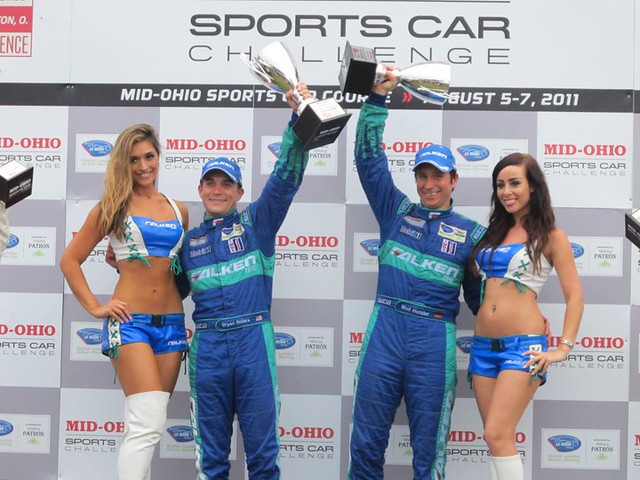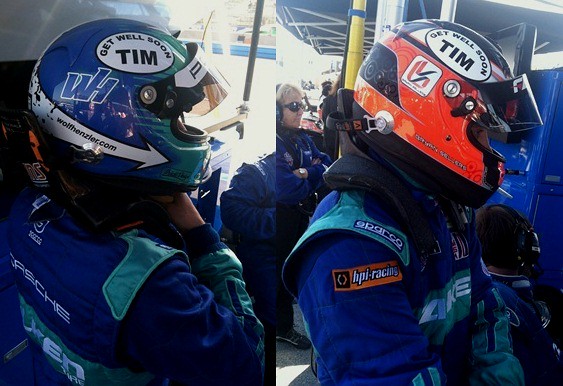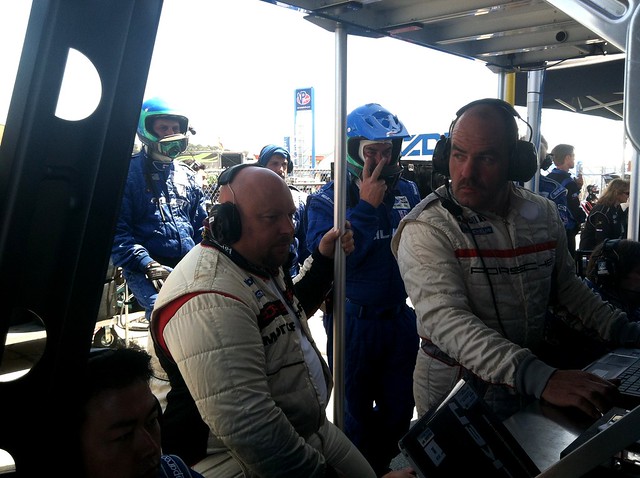In May 2009, Team Falken Tire unveiled the factory
American Le Mans Series team at Long Beach, racing the Porsche 911 GT3 RSR.
With drivers Dominic Cicero and Bryan Sellers behind the wheel, the team dubbed
as “The Little Tire that Could” competed against other tire manufacturer giants
in the series.
Team Falken Tire earned two wins for Porsche Motorsport
North America in 2011, one win in wet conditions at Mid-Ohio, and another in
the dry in the streets of Baltimore. Three years into the series, the team
continues the relationship with Porsche, racing the 2012 Porsche 911 GT3 RSR
with veteran Bryan Sellers and Porsche Factory driver Wolf Henzler.
At Round 3 at Mazda Raceway Laguna Seca, Falken Tire PR
sat down with Jens Walther, President of Porsche Motorsport North America, and Kevin Jones Falken Tire Supervisor ALMS Motorsports, to
dive into the Porsche Motorsport North America (PMNA) operation and discuss the
intricate investment in the ALMS Porsche teams.
 |
| Porsche Motorsports North America President Jens Walther with Falken driver Bryan Sellers |
Falken
PR: How did the relationship between Team Falken Tire and Porsche Motorsports
North America begin?
Kevin,
Falken: We evaluated our different options at the time and it
all kept pointing back to Porsche. Porsche has a proven track record in the
ALMS, they at the time had won something like four out of the last five championships. Second,
they had unparalleled support at the track, with the parts trailer, US based
headquarters, where other manufactures don’t necessarily offer the same type of
support in the United States. The third thing was at the time we looked at it
as Porsche Motorsport North America. PMNA is based in Santa Ana California,
Falken Tire is based in Fontana California; from a relationship standpoint
geographically it made sense as well.
Falken
PR:
Did the relationship in Europe with the
Falken Tyre team start about the same time?
(PR Note: The ALMS and VLN efforts are run independently as racing programs, but the tire development for both programs operates out of the same technical center and manufacturing plants in Japan)
Falken
PR: What is it that makes the 2012 Porsche 911 GT3 RSR competitive in the
American Le Mans Series GT class?
Jens,
PMNA: All of the cars
in the American Le Mans Series are based on a set of technical regulations and
all the manufacturers try to get the maximum out of those regulations. So
within the given framework, we try to be as good in performance as we can. We
are one of the cars without a mid-engine, which has always been a challenge. So
far, our engineers have always been able to compensate for this slight
disadvantage of not having the engine at the point where we would if we had a
generic car.
This year, we came out with an update based on the 997
Carrera model. We did a lot of work on the aero side and changed a lot of parts
on the suspension. Now, for the third race of the season here at Laguna Seca we
came up with an additional aero package that the ACO and IMSA observed
the last two races and found that we had a disadvantage. They gave us a waiver:
a new set of regulations where we could work a little bit on the aero in the
front and balance the car out in the rear. If you add down force to the car,
that means the car gets more drag, so you lose power. So to compensate that,
the ACO gave us a bigger restrictor, meaning we have more air coming into the
engine.
The last two weeks have been very dramatic in that
instance. If you have to rebuild parts overnight, you go in the wind tunnel
overnight and test them on the street and if they don’t work, you have to
rebuild them again. We’re very confident with what we have at the moment and we
think we are now with the car where it belongs. We re competitive in relation to the other manufacturers' products.
I think that really comes back as a philosophy question
for Porsche: why do we race? We’ve always been racing, we’ve always used racing
as a part to develop street cars. Since 1989 we have been concentrating completely on customer support programs.
That means we design and build race cars, we sell race cars, and we support our
customer programs at the race track. We have no factory program where we run as
a factory, but we utilize the resources to back the programs our customers, and
help them to develop their successful programs and help them, in Falken Tire’s
example, to develop the tires. Whenever there is feedback from the car when we
develop the car, we make sure that we allow the car to be as flexible so it can
run in different tires and it can run in different series. That’s an important
part that we really focus on programs for the customers.
Falken,
PR: In general, what kind of support does Porsche provide to customer teams at
American Le Mans Series events?
Jens,
PMNA: What we try to do is have an “aspirin” motorsports
program which is allowing our customers to go racing without headaches. We take
care of the framework. We negotiate with the rule makers about the rules at the
beginning of the year. If we feel that there is a disadvantage of any
manufacturer, for us and our customer teams, we are involved in discussions
about waivers.
This is why we have this emergency home here [Porsche
parts trailer], we have our engineering capacity sitting, we have parts supply
here, so if a car has a breakdown or needs a special part that is not on the
trailer of the team, we try to have all of the parts here.
Another part we concentrate on is marketing support and
the press support. We have our press department and our marketing department
going to the races, making sure we interlink the teams, media and Porsche customers. Here (at Mazda Raceway Laguna
Seca) we have a Porsche Corral, with hundreds of Porsches and Porsche customers
coming over. They are very interested in what our customer race teams do. The
marketing department makes sure there is communication between the paddock and
the customers. They also make sure the
team programs are supported in a way that they support the programs our
customers want to do and bring across the message of our brand.
Falken
PR: With so many Porsche’s running different support series on an ALMS race
weekend, does the Porsche 911 GT3 RSR require more attention than the cup cars?
Jens,
PMNA: Yes. The 911 GT3 RSR is the pinnacle of our race cars.
It’s the most sophisticated GT racecar we have. I have to say GT because we have a prototype
coming out in two years that will be even more sophisticated. This is a small
series of cars. We only produce 7 or 8 a year worldwide, so what comes on top
of what the regulations allow, changes within a small band, talking about the
most sophisticated and professional race teams in GT racing. The challenge here
is to support the customer teams with the information they need in order to
develop the car for their specific needs: tire, driver, and all the other
things they might be able to change.
There’s a lot of work for us to put in at Porsche
Motorsport North America. It doesn’t need so much attention in the American Le
Mans Series because the teams are so high level, they have all the capacities
themselves. We are basically just the
back office or the emergency. The higher you go in racing programs, the more support changes from pure consultancy and technical to development support.
Falken
PR: With three different tire manufacturers supplying the 2012 Porsche 911 GT3
RSR, how does this affect your evaluation of the Porsche’s performance compared
to the competition?
Jens,
PMNA: When we look at the performance of the car, we always
have to have a reference. The reference is the tire we test the car with in Weissach.
This is our bench mark where we work from. We try to work together with the
tire engineers and the development team of the manufacturer to make sure that
they understand the dynamics of the car from our baseline, and develop their
tire from there. There’s a lot of communication going between our engineer part
in Weissach and tire engineers at the different tire manufacturers. That’s
always a tricky one because obviously, since all the information comes together
at our place, it’s highly confidential situation, and we cannot release any
competitive data to anybody else. We’ve been doing this for many decades and we honor the development work and intellectual property of our partners
highly. We try to help everyone to develop their product in the direction they
want to go.
Falken
PR: What is most challenging about working with three different teams running
three different tires? What has surprised you?
Jens,
PMNA: It’s a pleasure to
work with different teams because we all share the same passion about this one
brand. On the other side, it still gives each team a completely different tone.
What’s most challenging for us is to understand the different directions the
tire manufacturers want to go in both technically and also from the commercial
side; To make sure we can support this from our side. Obviously we have a
corporate partner when it comes to tires, and that is sometimes a challenge
because the tire manufacturers want to utilize the partnership and through that
corporate partnership we have a common communication strategy.
But on the other
side, from a working environment, what has surprised us most is how tire manufacturers,
like Falken Tire last year was able to come up with a tire program with a new
car, a new team, with Walker Racing, and develop that in such a short time and
come out with two wins: One at a dry race and one at a wet race, which is surprising
for us because usually a tire manufacturer stresses the development in an early stage on either a wet or dry tire. The team two wins at
completely different races. That was a positive surprise to us, to see the
success of hard work.
 |
| Falken Tire drivers Bryan Sellers and Wolf Henzler on their first Falken winning podium at Mid-Ohio Sports Car Course |
Falken
PR: People unfamiliar with the sport usually think that
little training is needed to be a successful race car driver. Porsche Works
drivers are among the most skilled in the world, Falken Tire’s Wolf Henzler
being one of only nine. How are these drivers selected and what kind of
training do they have to go through?
Jens,
PMNA: Most of the factory drivers come from our own junior
program. Porsche for many years had junior program where we selected young
drivers from the age of 17 to 19. They were competing in the one-make cups, a great platform for future professionals. Other drivers are also out of the cup series.
Generally the factory drivers come out of the Porsche Cups, which is the
Porsche Carrera cup in Germany, Porsche Mobil 1 Supercup. All the cars are
technically identical, so it comes down to the driver. There are spring races
with standing starts, high stress factor, and you have to deliver. Our factory
drivers come out of this environment, so they’ve shown as a young driver that
they can compete in this environment.
Driving is an important talent but they also have
important talents when it comes to media, and technical feedback. The more you
go out of the Cup Car, the more you go to what is a GT car or eventually to a
prototype car, the more important it is you understand the car technically and
get the engineers the feedback to develop the car for you. You’re the only
person in the car. They can read as much as they want from better telemetry and from the data, but eventually it’s down to what you can feel in the
car and what you can turn into a faster lap time. This is a very important element.
The set of skills the factory drivers have is very wide.
We look for out-performance in each of the individual talents. They do a lot of
work on themselves, and it’s a full time job. We try to get them in the car as
much as we can. They do testing for us, they have a sincere fitness program,
and they do fitness camps with us. Another important thing is also to make sure
these nine drivers are sharing the same philosophy with our brand. They are
ambassadors for Porsche, they are ambassadors for our partners. That is
sometimes a challenge for them because one week they sit in a car in Japan for
a customer that is racing there, and the next week they’re racing at the Nurburgring,
in a completely different environment with a completely different tire and
customer team, and the next week they’re testing in Weissach, again in another
environment. They need to be flexible. We believe a lot in this team.
If you meet the drivers here in the paddock, they’re
usually like a family. One of our former drivers and one of our considered
family members Tim Bergmeister had his
accident and everybody was shocked. All the drivers were calling each other and
helping Jorg [his brother] with emails and the family as much as they could.
They consider this a family. The Porsche drivers are very competitive on the
track, but they consider themselves a team and we do a lot of team building.
 |
| Henzler and Sellers show support for Tim Bergmeister |
Falken PR: The relationships of Porsche Works drivers on opposing teams is that of
friendly competition, which can be a rare find amongst athletes this sport. In
training and developing these drivers, how do you ensure they maintain the
delicate balance between friends and competitors?
Jens,
PMNA: We do a lot of team building. They are trained not only
on the cars but on the brand, the philosophy behind our race programs, they
share the same ideas here. That’s together with the team workshops and that’s
important about how we get them together.
Falken
PR: How does development in Porsche Motorsport add direct benefit to the
consumer?
Jens,
PMNA: Motorsport has always been an integral part of Porsche. Unlike
other manufacturers, the Porsche motorsport department is a part of our Research
& Development group. There’s direct relation between the guys developing
the street cars and the guys developing the race cars. Whatever set up we test,
whatever new components we test in motorsports, it might end up in the street
car. We’ve seen a number of things go directly into the GT cars, such as GT2, the GT3, GT3RS, GT2RS,
those cars are developed by the same engineers who develop the race cars. They
take whatever they learn in terms of lightweight materials, performance parts,
aerodynamic parts and translate them into the GT street cars, and the
customer benefits directly from it.
This is why so many of our street car customers take their cars to the track and enjoy racing them on different levels - they are made for this. We’ve seen a number of things in racing, especially if you look at the aero parts which are now part of the street cars.
This is why so many of our street car customers take their cars to the track and enjoy racing them on different levels - they are made for this. We’ve seen a number of things in racing, especially if you look at the aero parts which are now part of the street cars.
Coming soon: Team Falken Tire and Porsche Part II: Fans Ask the Questions
Team Falken Tire News
- Saturday, June 16th, Team Falken Tire will be teaming up with Discount Tire to attend CruZionsville, a Central Indiana Porsche Club of America Porsche show in Zionsville, IN. The two-race winning #17 Porsche from the 2011 American Le Mans Series season will be on display and Falken Tire items, including a set of tires, will be raffled off to raise money for the Alzheimer's Organization. For more information, visit cruzionsville.com
- In addition to other Falken Tire Merchandise, the 2012 ALMS Falken shirts are for sale on alms.com. The series is offering 15% off your entire purchase through Father's Day. Falken merchandise can be found here.
Team Falken Tire News
- Saturday, June 16th, Team Falken Tire will be teaming up with Discount Tire to attend CruZionsville, a Central Indiana Porsche Club of America Porsche show in Zionsville, IN. The two-race winning #17 Porsche from the 2011 American Le Mans Series season will be on display and Falken Tire items, including a set of tires, will be raffled off to raise money for the Alzheimer's Organization. For more information, visit cruzionsville.com
- In addition to other Falken Tire Merchandise, the 2012 ALMS Falken shirts are for sale on alms.com. The series is offering 15% off your entire purchase through Father's Day. Falken merchandise can be found here.


No comments:
Post a Comment